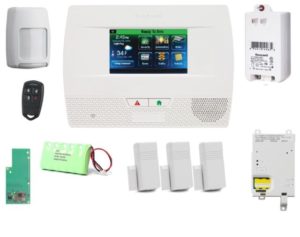Wireless and Cellular Alarm Systems
Today more and more businesses have switched over to Voice Over IP systems. But in the event that those powered systems go down due to a power outage, your alarm system will not work. You are at your most vulnerable when your power is out, you don’t want the added risk of no alarm. So you need to switch to a cellular radio network. Rendin Alarm can help. We want you to think about scenarios such as pets left home alone. In the event of a gas leak or carbon monoxide leak when the system is down, they are at risk.

Honeywell Wireless Alarm System.
In the context of home security systems, a distinction is made between wireless and cellular in order to differentiate the transfer of alarm signals within the home with how signals are sent from the home to the outside.
- ‘Wireless’ refers to the communications method inside the home between the sensors and the control panel.
- ‘Cellular’ pertains to the wireless approach used to send signals from the control panel to the outside such as to the monitoring station or to a smart device.
To clarify further: Inside the home, communications between the alarm system’s sensors and control panel are either wired or wireless. When an alarm is triggered, the control panel can be set up to contact the monitoring station through a landline phone or internet connection; or, wirelessly via cellular links. A home security system is said to be fully wireless then if it is ‘wireless with cellular monitoring’.Let’s break it down:
What’s Wireless?
In a wired set-up, communication is done via wires which run through the power supply, control panel and sensors. In a wireless home security system, information is not transferred through wires or cables. Alarm signals are transmitted wirelessly between the different sensors and the control panel using proprietary radio frequencies. Proprietary? meaning that the system has a frequency different from other wireless devices so that they do not interfere each other.
What’s Cellular?
Cellular refers to the wireless approach to sending an alarm signal from the control panel to the outside. Many home security companies now offer the option of cellular monitoring with their wireless systems. With this type of monitoring, a cellular module is built-in to the control panel so that when the alarm goes off, the panel immediately sends a signal to the monitoring station using cellular and radio-based technology, the same way that text messages are sent.
Cellular pertains also to communications between the security system and a smart device. For example, the control unit can be programmed to send text alerts to the homeowner’s smartphone to report system activity.
Wireless with Cellular Monitoring
A fully wireless home security system ?a wireless alarm set-up inside the home plus cellular monitoring — is considered a best of both worlds scenario. Together in one package, they leverage each other’s strengths:
- Easy to install and use.
- More reliable, faster data transmission since the control panel operates like a cellphone on a network dedicated to the home alarm system.
- The cellular network, through smartphone and tablet applications, allows a homeowner to be constantly connected in real time to the alarm system and to other integrated home automation functions.
- Safer with no power and phone lines for potential intruders to cut to disable the system.
- Less vulnerable to power outages which affect wired set-ups.
For more information, Contact Us at (610) 544-5755 or follow us here!
